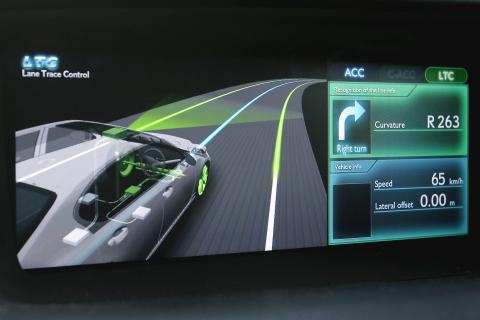Toyota Motor Corp yesterday unveiled the next generation of cars featuring an autopilot system that will swerve to avoid collisions and also keep to the middle of the road, all without drivers touching the wheel.
The Japanese giant autos using the self-driving technology could be available on the market in just a few years’ time.
“These advanced driving support technologies prevent human errors, reduce driving stress and help drivers avert accidents, which has a big potential to reduce the number of traffic deaths,” Toyota managing director Moritaka Yoshida said at a presentation in Tokyo.

Photo: Bloomberg
Leading automakers and technology firms, including Toyota, rival Nissan Motor Co and Internet giant Google Inc, have been working on self-driving and assisted-driving technology for many years.
Toyota, the world’s biggest auto manufacturer, said that while drivers would still need to be alert and to take part in the driving process, it essentially lets people put the vehicle on autopilot, leaving most of the work to the computer system.
The Automated Highway Driving Assist (AHDA) system lets vehicles communicate wirelessly to avoid running into each other, while keeping the car in the middle of the road lane — no matter how many twists and turns lie ahead.
“Cars with these technologies recognize the accelerating or slowing speed of those ahead, which also helps avoid traffic jams,” project manager Mitsuhisa Shida said.
“They can wirelessly exchange data once every 0.1 seconds,” Shida added.
The company plans to install AHDA in its commercial models over the next few years.
Toyota has already introduced the pre-collision braking assist system in its Lexus luxury sedan and plans to install it in other models by 2015, with the other technologies to follow.
Many cars already have systems that gives drivers a panoramic view to keep watch for nearby objects while parking itself.
The latest collision-avoidance system has doubled the detection time of oncoming objects to four seconds from a previous two seconds, Toyota added.
The automaker said such advances would be especially helpful for older people.
Japan’s society is rapidly ageing with over-65s already making up around a quarter of the 128 million-strong population.

To many, Tatu City on the outskirts of Nairobi looks like a success. The first city entirely built by a private company to be operational in east Africa, with about 25,000 people living and working there, it accounts for about two-thirds of all foreign investment in Kenya. Its low-tax status has attracted more than 100 businesses including Heineken, coffee brand Dormans, and the biggest call-center and cold-chain transport firms in the region. However, to some local politicians, Tatu City has looked more like a target for extortion. A parade of governors have demanded land worth millions of dollars in exchange

An Indonesian animated movie is smashing regional box office records and could be set for wider success as it prepares to open beyond the Southeast Asian archipelago’s silver screens. Jumbo — a film based on the adventures of main character, Don, a large orphaned Indonesian boy facing bullying at school — last month became the highest-grossing Southeast Asian animated film, raking in more than US$8 million. Released at the end of March to coincide with the Eid holidays after the Islamic fasting month of Ramadan, the movie has hit 8 million ticket sales, the third-highest in Indonesian cinema history, Film

Taiwan Semiconductor Manufacturing Co’s (TSMC, 台積電) revenue jumped 48 percent last month, underscoring how electronics firms scrambled to acquire essential components before global tariffs took effect. The main chipmaker for Apple Inc and Nvidia Corp reported monthly sales of NT$349.6 billion (US$11.6 billion). That compares with the average analysts’ estimate for a 38 percent rise in second-quarter revenue. US President Donald Trump’s trade war is prompting economists to retool GDP forecasts worldwide, casting doubt over the outlook for everything from iPhone demand to computing and datacenter construction. However, TSMC — a barometer for global tech spending given its central role in the

Alchip Technologies Ltd (世芯), an application-specific integrated circuit (ASIC) designer specializing in server chips, expects revenue to decline this year due to sagging demand for 5-nanometer artificial intelligence (AI) chips from a North America-based major customer, a company executive said yesterday. That would be the first contraction in revenue for Alchip as it has been enjoying strong revenue growth over the past few years, benefiting from cloud-service providers’ moves to reduce dependence on Nvidia Corp’s expensive AI chips by building their own AI accelerator by outsourcing chip design. The 5-nanometer chip was supposed to be a new growth engine as the lifecycle